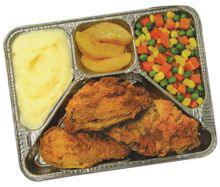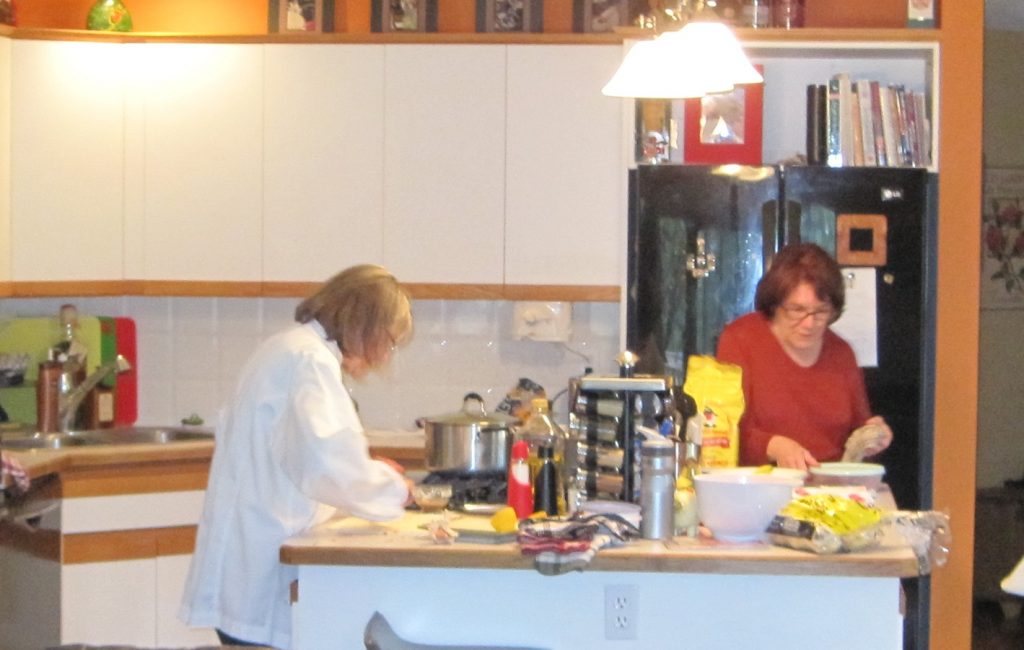Do any of these apply to you?
- You’re spending more than you want to on dining out
- You’re appalled at how much food you’re throwing out
- You wonder why the fridge and cupboards are full, but there’s nothing to eat.
Getting a nutritious and tasty dinner on the table in a timely and affordable manner is a challenge that never ends. Working against you is lack of time and energy. In order to win, you need skills and strategy. And that will feed your motivation.
Where I got my kitchen skills
When I was growing up in the ‘60s and ‘70s, women were moving en masse into full time jobs. My mother was one of them. But many of their mothers also worked full time. My grandmother, for instance, had a string of jobs outside the home: in a boarding house making pies and cakes, in a dry-cleaners, and then as a garment inspector at GWG.
I felt lucky to be in my grandmother’s kitchen while she made meals from scratch with home-grown ingredients. Every summer she canned and dried produce from her garden and made jams, jellies, and pies from buckets of berries that she picked in the wild. A few of her sisters had farms—the city sisters gathered there to kill and butcher chickens which they took home to can or freeze. Throughout the year, Grandma baked. All this while working full time.
My mother’s approach was to take advantage the new convenience foods that were being developed, especially in the late ‘60s and ‘70s. This was the era of Swanson TV Dinners, spaghetti sauce made from a powder, instant mashed potatoes, Hamburger Helper, and Kraft pizza made from ingredients in a box. These were the days before pizza restaurants (“pizza parlors”) were widespread.

My mother did love to cook, but she did it more as a luxury—a fancy meal for a special occasion.
By the way, my father had one cooking skill, and that was making pancakes. If you can make one thing, you will never starve.
My own interest in food leaned toward cooking from scratch and eating nutritiously. When my baby started taking solid food, I never bought “baby food”. I mashed up what we were eating. From lamb stew to lasagna, she ate it all.
I was working full time, and the responsibility for feeding the three of us was all on me. Getting supper underway when I got home was my first priority, and it went well enough. Rarely did we eat in restaurants because that just seemed to take the whole evening, and I would rather be doing other things.
Meals on the weekends was harder. I’d get working on a project and lose track of time. And then we’d be scrambling and getting testy from hunger. Looking back, I think I was avoiding the kitchen on weekends because I was chained to it through the week. I must have been feeling like I needed a break.
At the same time, I was becoming passionate about working smarter, not harder, in all things to do with homemaking. From 1996 to 2010, I devoured every Martha Stewart Living magazine, and I still have all the issues.
In 2008, I fulfilled my dream and enrolled in the Culinary Bootcamp at NAIT. It was an intensive week-long, 12 hours a day program, where we made fabulous lunches and dinners which we ate ourselves. I improved my cooking skills about a thousand percent by learning the techniques used by professional chefs and getting rid of bad habits. I loved it so much that two years later, I went back for Level II Bootcamp.

The experience of Culinary Bootcamp was a powerful boost to my motivation in the kitchen. It’s even made me smarter about eating in restaurants.
Let’s start cooking again
Before Julia Child passed away, I heard her lament that “families don’t cook any more”. That surprised me and made me sympathetic to people who make the effort, no matter how they get there. I rejoice whenever I see young people, and especially solo men, in the grocery store buying semi-finished ingredients that at least get them half way to a home-cooked meal.
My dream is that YOU have the desire and confidence to up your game in the kitchen. Especially if you missed out on learning the skills when you were growing up.
We can all improve our skills in picking out ingredients for quality and suitability, knowing how to work our tools, and minimizing waste of food and money. Only then we can we enjoy the process and the pleasure of cooking, and not feel tied to the kitchen. Because feeding ourselves and our loved ones well will just make more room for everything else we enjoy in life.